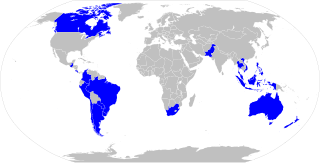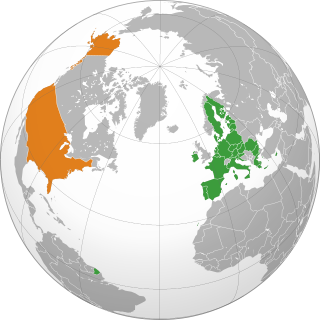Related Research Articles
The General Agreement on Tariffs and Trade (GATT) is a legal agreement between many countries, whose overall purpose was to promote international trade by reducing or eliminating trade barriers such as tariffs or quotas. According to its preamble, its purpose was the "substantial reduction of tariffs and other trade barriers and the elimination of preferences, on a reciprocal and mutually advantageous basis."

The Free Trade Area of the Americas (FTAA) was a proposed agreement to eliminate or reduce the trade barriers among all countries in the Americas, excluding Cuba. Negotiations to establish the FTAA ended in failure, however, with all parties unable to reach an agreement by the 2005 deadline they had set for themselves.

The Common Agricultural Policy (CAP) is the agricultural policy of the European Commission. It implements a system of agricultural subsidies and other programmes. It was introduced in 1962 and has since then undergone several changes to reduce the EEC budget cost and consider rural development in its aims. It has however, been criticised on the grounds of its cost, its environmental, and humanitarian effects.

An agricultural subsidy is a government incentive paid to agribusinesses, agricultural organizations and farms to supplement their income, manage the supply of agricultural commodities, and influence the cost and supply of such commodities.
Dumping, in economics, is a form of predatory pricing, especially in the context of international trade. It occurs when manufacturers export a product to another country at a price below the normal price with an injuring effect. The objective of dumping is to increase market share in a foreign market by driving out competition and thereby create a monopoly situation where the exporter will be able to unilaterally dictate price and quality of the product. Trade treaties might include mechanisms to alleviate problems related to dumping, such as countervailing duty penalties and anti-dumping statutes.

The Cairns Group is an interest group of 19 agricultural exporting countries, composed of Argentina, Australia, Brazil, Canada, Chile, Colombia, Costa Rica, Guatemala, Indonesia, Malaysia, New Zealand, Pakistan, Paraguay, Peru, the Philippines, South Africa, Thailand, Uruguay, and Vietnam.

Trade barriers are government-induced restrictions on international trade. According to the theory of comparative advantage, trade barriers are detrimental to the world economy and decrease overall economic efficiency.

The Uruguay Round was the 8th round of multilateral trade negotiations (MTN) conducted within the framework of the General Agreement on Tariffs and Trade (GATT), spanning from 1986 to 1993 and embracing 123 countries as "contracting parties". The Round led to the creation of the World Trade Organization, with GATT remaining as an integral part of the WTO agreements. The broad mandate of the Round had been to extend GATT trade rules to areas previously exempted as too difficult to liberalize and increasingly important new areas previously not included. The Round came into effect in 1995 with deadlines ending in 2000 under the administrative direction of the newly created World Trade Organization (WTO).

Trade justice is a campaign by non-governmental organisations, plus efforts by other actors, to change the rules and practices of world trade in order to promote fairness. These organizations include consumer groups, trade unions, faith groups, aid agencies and environmental groups.
The Lomé Convention is a trade and aid agreement between the European Economic Community (EEC) and 71 African, Caribbean, and Pacific (ACP) countries, first signed in February 1975 in Lomé, Togo.

The economy of Europe comprises about 748 million people in 50 countries. The formation of the European Union (EU) and in 1999 the introduction of a unified currency, the Euro, brought participating European countries closer through the convenience of a shared currency. The European Union is a unique global organisation, an entity forming one of the largest economies in the world. The European Union also “regulates” the global market by the single market. The difference in wealth across Europe can be seen roughly in the former Cold War divide, with some countries breaching the divide. Whilst most European states have a GDP per capita higher than the world's average and are very highly developed, some European economies, despite their position over the world's average in the Human Development Index, are relatively poor. Europe has total banking assets of more than $50 trillion and its Global assets under management has more than $20 trillion.
The UK rebate was a financial mechanism that reduced the United Kingdom's contribution to the EU budget in effect since 1985. It was a complex calculation which equated to a reduction of approximately 66% of the UK's net contribution – the amount paid by the UK into the EU budget less receipts from the EU budget. Based on a net contribution of €11.7 (£9.6) billion in 2016, the UK Treasury estimated the 2017 rebate amounted to €6.6 (£5.6) billion reducing the ultimate UK contribution for the 2017 budget to €10.4 (£8.9) billion. Although the rebate was not set in the EU treaties, it was negotiated as part of the Multiannual Financial Framework (MFF) every seven years and had to be unanimously agreed.
The Doha Development Round or Doha Development Agenda (DDA) is the trade-negotiation round of the World Trade Organization (WTO) which commenced in November 2001 under then director-general Mike Moore. Its objective was to lower trade barriers around the world, and thus facilitate increased global trade.
The Agreement on Agriculture (AoA) is an international treaty of the World Trade Organization. It was negotiated during the Uruguay Round of the General Agreement on Tariffs and Trade, and entered into force with the establishment of the WTO on January 1, 1995.
This is a timeline of the World Trade Organization (WTO).
The Brazil–United States cotton dispute was a World Trade Organization dispute settlement case (DS267) on the issue of unfair subsidies on cotton. In 2002, Brazil—a major cotton export competitor—expressed its growing concerns about United States cotton subsidies by initiating a WTO dispute settlement case against certain features of the U.S. cotton program. On March 18, 2003, a Panel was established to adjudicate the dispute. Argentina, Canada, China, Taiwan, the European Communities, India, Pakistan, and Venezuela participated as third parties. Focusing on six specific claims relating to US payment programmes, Brazil argued that the US had failed to abide by its commitments in the Uruguay Round Agreement on Agriculture (AoA) and the Agreement on Subsidies and Countervailing Measures (SCM). On September 8, 2004, a WTO dispute settlement (DS) panel ruled against the United States on several key issues in case.
The Ministerial Conference is the top decision making body of the World Trade Organization (WTO). There have been twelve ministerial conferences from 1996 to 2022, usually every two years.
The Five Year Plan was an Argentine state-planning strategy, during the first government of President Juan Domingo Perón.

Vangelis (Evangelos) Vitalis is a New Zealand diplomat and trade negotiator currently working as the Deputy Secretary for the country's Ministry of Foreign Affairs and Trade.

The Transatlantic Trade and Investment Partnership (TTIP) was a proposed trade agreement between the European Union (EU) and the United States, with the aim of promoting trade and multilateral economic growth. According to Karel de Gucht, European Commissioner for Trade between 2010 and 2014, the TTIP would have been the largest bilateral trade initiative ever negotiated, not only because it would have involved the two largest economic areas in the world but also "because of its potential global reach in setting an example for future partners and agreements".
References
 This article incorporates public domain material from Jasper Womach. Report for Congress: Agriculture: A Glossary of Terms, Programs, and Laws, 2005 Edition (PDF). Congressional Research Service.
This article incorporates public domain material from Jasper Womach. Report for Congress: Agriculture: A Glossary of Terms, Programs, and Laws, 2005 Edition (PDF). Congressional Research Service.